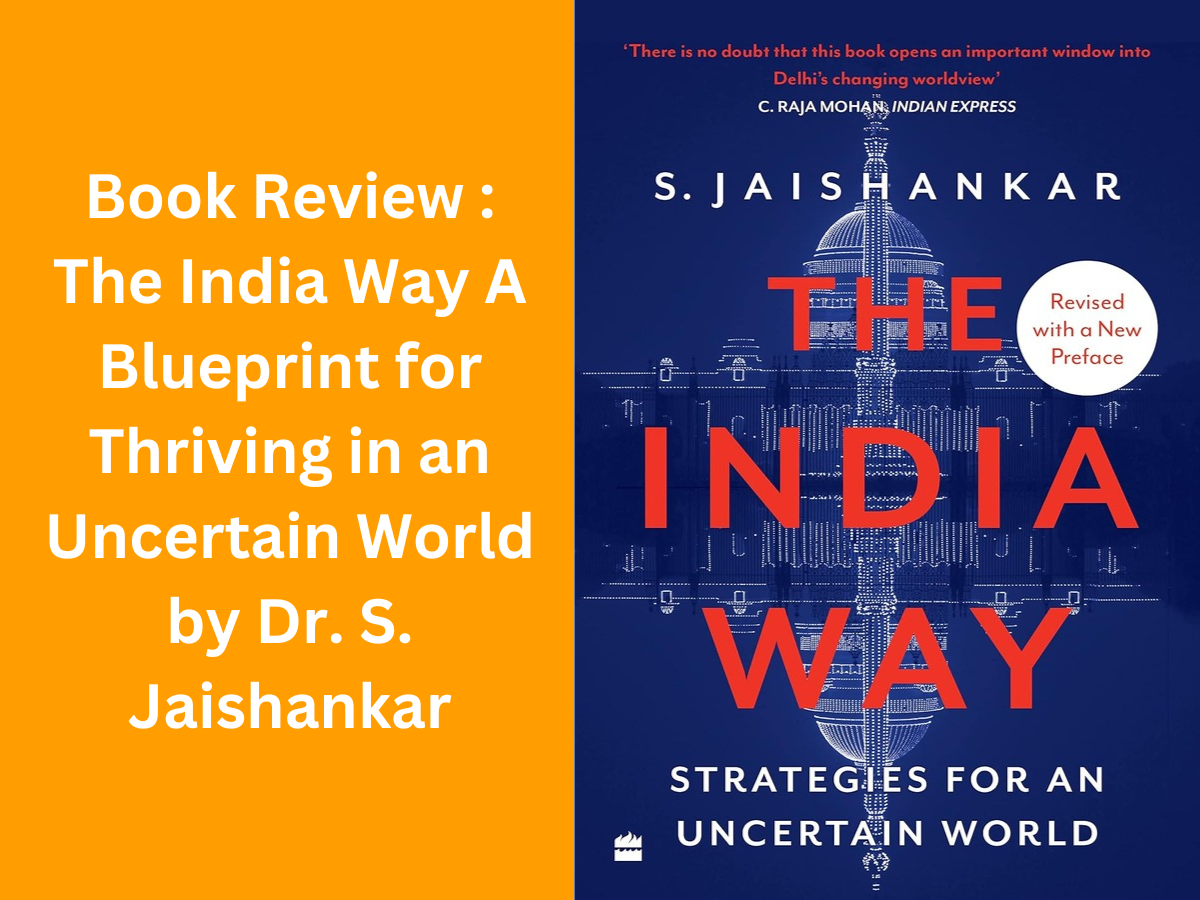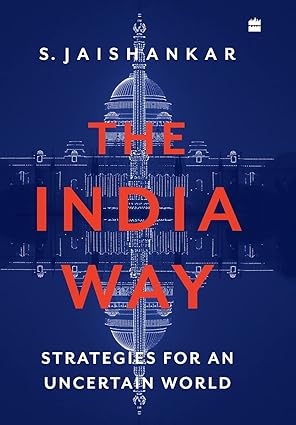Table of Contents
1. Introduction
“The India Way” by Dr. S. Jaishankar is a book that outlines India’s strategic approach to its foreign relations and global diplomacy. The book presents a comprehensive analysis of India’s foreign policy and the challenges it faces in an ever-changing and uncertain world.
2. Key ideas or arguments presented
The book argues that India’s foreign policy is guided by its civilizational ethos, which values pluralism, diversity, and inclusivity. India’s approach to global diplomacy is based on the principles of non-alignment, strategic autonomy, and a desire for peaceful coexistence with other nations.
The author also discusses India’s efforts to balance its relations with major powers such as the United States, China, and Russia. He argues that India must leverage its strategic location, demographic dividend, and economic potential to enhance its role as a major player in the global arena.
3. Main sections of the book
The book is divided into four sections:
- The first section provides an overview of India’s civilizational ethos and how it informs the country’s foreign policy.
- The second section discusses India’s approach to global diplomacy and its relations with major powers.
- The third section examines India’s role in the Indo-Pacific region and its strategic interests in the region.
- The fourth section looks at India’s challenges in changing world order and the strategies it can adopt to overcome them.
4. Key takeaway or conclusion
The main takeaway from “The India Way” is that India’s foreign policy is guided by its civilizational ethos, which values pluralism, diversity, and inclusivity. India’s approach to global diplomacy is based on the principles of non-alignment, strategic autonomy, and a desire for peaceful coexistence with other nations.
The book also highlights India’s efforts to enhance its role as a major player in the global arena by leveraging its strategic location, demographic dividend, and economic potential. It suggests that India must adapt to the changing world order by adopting innovative strategies to overcome its challenges.
5. Author’s background and qualifications
S. Jaishankar is a veteran diplomat and the current External Affairs Minister of India. He has served as India’s Foreign Secretary and Ambassador to various countries, including the United States and China. Jaishankar is widely respected for his expertise in foreign policy and strategic affairs.
6. Target audience or intended readership
The book is intended for policymakers, diplomats, scholars, and anyone interested in understanding India’s foreign policy and its role in the global arena.
7. Reception or critical response to the book
“The India Way” has received positive reviews for its comprehensive analysis of India’s foreign policy and the challenges it faces. The book has been praised for its insightful analysis and the author’s expertise in the field.
8. Other recommendations
Other books on similar topics include
- India’s Foreign Policy: Retrospect and Prospect by Sumit Ganguly.
- India and the Changing World Order by Swaminathan Gurumurthy
9. Five takeaways from “The India Way”
- India’s foreign policy is guided by its civilizational ethos, which values pluralism, diversity, and inclusivity. The book argues that India’s unique identity as a civilization-state informs its approach to foreign policy and that it’s cultural heritage and history shape its strategic interests and objectives.
- India’s approach to global diplomacy is based on the principles of non-alignment, strategic autonomy, and a desire for peaceful coexistence with other nations. The book emphasizes that India’s foreign policy is not aligned with any major power bloc, but seeks to maintain strategic autonomy and pursue its own interests based on pragmatic considerations.
- India must leverage its strategic location, demographic dividend, and economic potential to enhance its role as a major player in the global arena. The book highlights the importance of India’s geostrategic location, its young and dynamic population, and its rapidly growing economy, and suggests that India must leverage these advantages to enhance its global influence.
- India faces challenges in changing world order and must adopt innovative strategies to overcome them. The book identifies several challenges that India faces in the current global landscape, including strategic competition among major powers, the rise of non-state actors, and the impact of disruptive technologies, and proposes innovative strategies to address these challenges.
- India’s role in the Indo-Pacific region is critical, and it must pursue a proactive and constructive approach to shaping the regional order. The book argues that India’s strategic interests are closely tied to the Indo-Pacific region and that India must pursue a proactive and constructive approach to shaping the regional order in collaboration with other key stakeholders.
Other Books You May Enjoy
Summary of Imagining India: The Idea of a Renewed Nation by Nandan Nilekani
Book Review: Rebooting India: Realizing a Billion Aspirations by Nandan Nilekani & Viral Shah






105 Comments
Your point of view caught my eye and was very interesting. Thanks. I have a question for you.
buy tiktok ads accounts https://buy-tiktok-ads.org
buy tiktok ads account https://tiktok-ads-agency-account.org
buy tiktok ads accounts https://buy-tiktok-business-account.org
buy tiktok business account https://buy-tiktok-ads-accounts.org
buy tiktok ads account https://buy-tiktok-ad-account.org
buy tiktok ad account https://tiktok-agency-account-for-sale.org
buy tiktok ads https://tiktok-ads-account-for-sale.org
tiktok ads agency account https://tiktok-ads-account-buy.org
tiktok ads agency account https://buy-tiktok-ads-account.org
buy business manager facebook https://buy-business-manager-accounts.org/
buy facebook business managers verified-business-manager-for-sale.org
buy business manager buy-bm.org
buy verified facebook https://buy-business-manager-verified.org
facebook business manager for sale https://business-manager-for-sale.org
buy facebook business account https://buy-verified-business-manager.org/
buy verified facebook business manager facebook bm account
buy facebook business managers https://buy-business-manager-acc.org
buy facebook verified business manager buy-bm-account.org
adwords account for sale https://buy-verified-ads-account.work
buy bm facebook https://buy-business-manager.org/
google ads agency account buy https://ads-agency-account-buy.click
adwords account for sale https://sell-ads-account.click
buy aged google ads accounts https://buy-ads-agency-account.top
google ads account for sale https://buy-account-ads.work
buy google ads invoice account https://buy-ads-invoice-account.top
sell google ads account https://ads-account-buy.work
sell google ads account https://ads-account-for-sale.top/
facebook ad account buy https://buy-accounts.click
buy google ads agency account https://buy-ads-accounts.click
buy google ads agency account google ads reseller
buy fb account buy a facebook account
buying facebook accounts cheap facebook advertising account
В этом интересном тексте собраны обширные сведения, которые помогут вам понять различные аспекты обсуждаемой темы. Мы разбираем детали и факты, делая акцент на важности каждого элемента. Не упустите возможность расширить свои знания и взглянуть на мир по-новому!
Подробнее – https://medalkoblog.ru/
buy ad account facebook https://ad-account-for-sale.top
buy a facebook ad account buy facebook ad accounts
fb accounts for sale https://ad-account-buy.top
buy aged facebook ads accounts https://buy-ads-account.click
buy facebook profiles buy aged facebook ads accounts
facebook ad account buy https://buy-ad-accounts.click
cheap facebook account buying facebook ad account
маркетплейс аккаунтов https://kupit-akkaunt.online/
магазин аккаунтов akkaunty-dlya-prodazhi.pro
продажа аккаунтов https://online-akkaunty-magazin.xyz/
маркетплейс аккаунтов соцсетей akkaunty-optom.live
маркетплейс аккаунтов https://kupit-akkaunty-market.xyz
биржа аккаунтов https://akkaunty-market.live/
магазин аккаунтов https://akkaunt-magazin.online
продажа аккаунтов https://kupit-akkaunt.xyz/
биржа аккаунтов https://rynok-akkauntov.top/
площадка для продажи аккаунтов маркетплейсов аккаунтов
account buying service accounts-marketplace-best.pro
account trading service https://accounts-marketplace.online
profitable account sales https://social-accounts-marketplace.live
buy account https://buy-accounts.live
buy account https://buy-accounts-shop.pro
purchase ready-made accounts https://buy-accounts.space/
account trading platform social-accounts-marketplace.xyz
ready-made accounts for sale https://accounts-marketplace.live/
social media account marketplace account marketplace
guaranteed accounts https://buy-best-accounts.org
sell account https://accounts-marketplace.xyz
website for buying accounts https://accounts-offer.org
account buying service account market
secure account purchasing platform account buying platform
account marketplace accounts market
website for selling accounts accounts for sale
database of accounts for sale account catalog
verified accounts for sale account acquisition
social media account marketplace marketplace for ready-made accounts
purchase ready-made accounts account store
account trading account trading platform
account store account trading platform
account exchange online account store
buy and sell accounts social-accounts-marketplace.org
account exchange service marketplace for ready-made accounts
buy pre-made account online account store
account sale ready-made accounts for sale
find accounts for sale secure account sales
account market account market
verified accounts for sale account selling platform
account buying platform guaranteed accounts
buy account account exchange service
secure account purchasing platform account selling service
secure account sales account marketplace
account catalog buy account
account trading service database of accounts for sale
account trading platform website for selling accounts
Account Trading Platform Secure Account Sales
Account Acquisition https://buyaccounts001.com
Accounts for Sale Accounts marketplace
Website for Buying Accounts Account Trading Platform
Sell Account Account Selling Service
Account Selling Service Account Selling Service
Online Account Store Account Trading Platform
Account Buying Platform Social media account marketplace
Purchase Ready-Made Accounts Purchase Ready-Made Accounts
Accounts for Sale Account Trading
купить аккаунт купить аккаунт с прокачкой
услуги по продаже аккаунтов гарантия при продаже аккаунтов
площадка для продажи аккаунтов продать аккаунт
маркетплейс аккаунтов соцсетей маркетплейс для реселлеров
аккаунты с балансом аккаунты с балансом
заработок на аккаунтах магазин аккаунтов социальных сетей
аккаунты с балансом https://birzha-akkauntov-online.ru